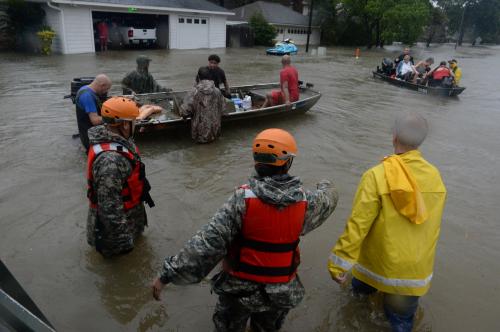Within 10 days of Hurricane Katrina making landfall in New Orleans in 2005, Congress and President George W. Bush acted decisively. Although the feds then faced similar budgetary circumstances in their deliberations on how to fund recovery, Congress approved, and the president signed, two supplemental emergency bills to secure emergency housing, medical, and other aid for impacted families and communities.
When the Trump administration proposes its Hurricane Harvey recovery aid package as early as next week, it and Congress could take a few lessons from their predecessors’ responses in the aftermath of Hurricane Katrina. Such foresight would show that speed of action, scale of aid, and interagency coordination can set a strong foundation for helping people and communities restore their lives and activities.
Swift funding and coordination is key because the Federal Emergency Management Agency (FEMA) must have adequate cash on hand to meet the immediate needs of Texans who are forced to live in temporary shelters, unable to get to work and not sure how they can put their lives and homes back together again. Quick decisive action also matters to the marketplace, such as homeowners, businesses, and other private sector investors who will want the security of knowing their investments will be matched by public ones. While responsiveness matters in disaster recovery, quality and accountability cannot be ignored, as speed can create mistakes, disorganization and waste.
The President and congress have blueprints from previous disasters, namely Katrina. They should consider them.
We know the size and scope of the disaster will deplete the limited reserves of FEMA, so supplemental bills are necessary to cover the immediate and long term costs. The Washington Post reports that FEMA’s federal Disaster Relief Fund “had a balance of only $3.8 billion at the end of July, of which $1.6 billion is already designated.” Most estimate the storm costing in excess of $200 billion, far exceeding the $120 billion that New Orleans received in federal dollars. While it’s too early to estimate the costs of the immediate response, what’s on hand is woefully insufficient to support the upwards of 7.5 million residents in the area who are potentially impacted.
But fiscal resources aren’t the only forms of capital needed. President Trump will have to deploy members of his cabinet to assess and support the range of family and community needs a disaster of this magnitude creates. The departments of Housing and Urban Development (HUD), Transportation, Health and Human Services, and Education—and the Army Corps of Engineers—all played key roles in providing emergency housing, services, and longer-term rebuilding dollars to the impacted region after Katrina. For Texans’ sake, it’s vitally important that these units coordinate with themselves as well as their state and local counterparts to maximize effectiveness and efficiency.
Leadership equates to coordination given the wide range of actors who are at play. Within three months, Bush created a “recovery czar” to coordinate the federal recovery effort across the federal agencies, the state(s), and localities, including outreach to the private sector. The federal coordinator was Don Powell, a former chairman of the Federal Deposit Insurance Corporation, and a native of Texas! Given the scale of the disaster, creating such a coordinator may make sense, especially with advice from Powell. [Powell reflects here on his experience during the 10-year anniversary of Katrina.]
The victims in temporary shelters need immediate and effective action. Congress returns from summer recess next week, and they will have to quickly deliberate on which financial package they will eventually vote upon. An unpopular congress—in particular, a Republican controlled one—will be heavily scrutinized. Members of congress who are on the record for proposing cuts to FEMA may be persuaded by the political prospects of not responding effectively to a disaster in a stronghold Republican state that has shown signs in recent elections of potentially turning purple via increased Democratic party appeal. But the real issue is meeting the vital needs of people in these impacted communities.
However high the political stakes, nothing can exceed the needs of Houstonians in the thralls of homelessness, joblessness, and overall insecurity. The President and congress have blueprints from previous disasters, namely Katrina. They should consider them.
The Brookings Institution is committed to quality, independence, and impact.
We are supported by a diverse array of funders. In line with our values and policies, each Brookings publication represents the sole views of its author(s).








Commentary
Federal funds, speed and coordination matter to post-Harvey recovery efforts
Friday, September 1, 2017